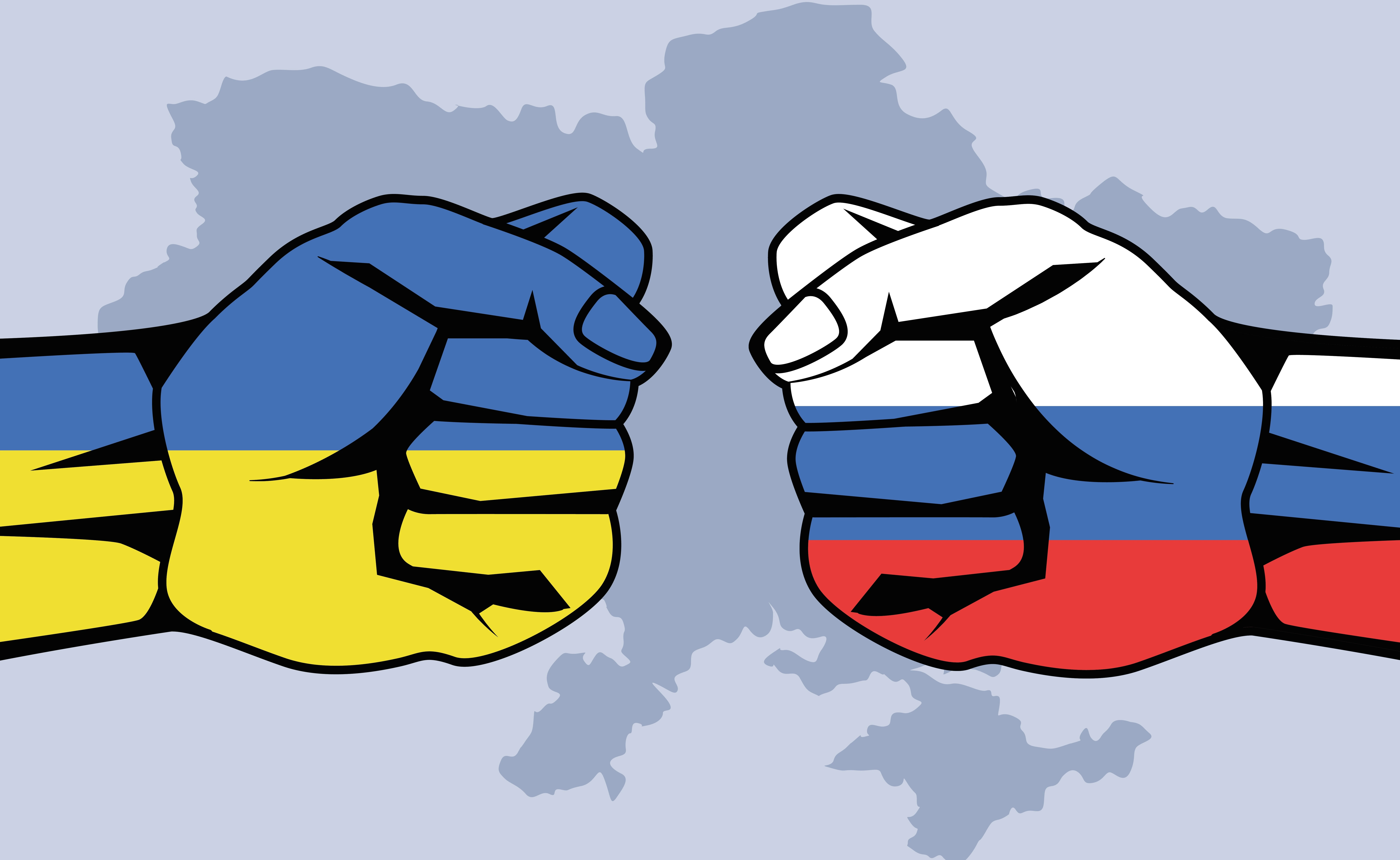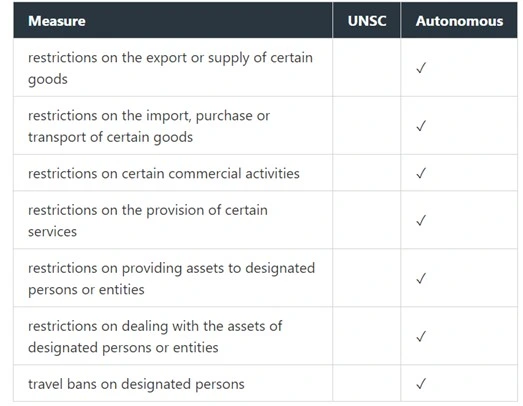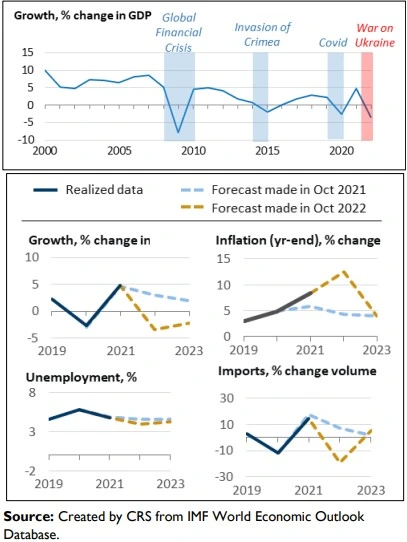What are the most likely implications of the economic sanctions imposed on Russia?

How have the sanctions on Russia shattered the globe's economy
On the 24th of February 2022, Russia invaded Ukraine, an escalation of the Russo-Ukrainian war that began in 2014. This shattered the reputation of Russia as the reason given was to “demilitarise and de-Nazify” the country given Ukraine was led by a Jewish President. Many around the world believed this reason unjustifiable, leading to titanic disruptions and having broken the foundations of world peace. With tensions rising higher than ever, a novel of economic sanctions was placed upon Russia to punish their $1.8 trillion economy, cut off support, and to cripple any military attacks moving forward in the future. The measures taken against Russia are intended to not impact Russian civilians; hence food, agriculture, health, and Pharma are excluded from the imposed sanctions. They are meant to target the political, military, and economic invasion to cripple any further acts of war attempts.
Figure 1 : List of economic sanctions imposed on Russia.

Firstly, the primary implications are economic. Figure 1 (above) lists the main economic sanctions imposed onto Russia. On top of this, half of Russia’s $580 billion of currency reserves were frozen with major banks cut off from the global payments system. America no longer buys Russian oil and Russian oligarchs are facing travel bans and asset freezes. The short-term goal of these sanctions was to trigger a balance-of-payments crisis in Russia, where they would have no imports or exports available to them which in effect would devalue and weaken the Russian Ruble. A positive implication of Russia’s economic sanctions is that this acts as a strong deterrent to others from warmongering. Supplies of non-sanctioned goods, even to friendly states, are being hampered by the rejection of international shipping companies to work with Russia. This would help to stabilize the peace that the world has.
These sanctions would interfere with the Russian government’s macroeconomic objectives as the effects of these sanctions would result in negative economic growth, unstable balance of payments and there would be heavy inflation. On the other hand, nine months after the initial invasion, the Russian economy is doing better than expected. The predicted collapse was avoided and the foretold eight to ten percent drop in Gross Domestic Product had been reduced to only three to four percent. This does not change the fact that before this escalation of the Russo – Ukrainian war, Russia was expecting a three percent increase in GDP and now looks at a decade of stagnation followed by a decade of recession.
Economists have created model–based estimates of Russia’s long-run growth by two–thirds since the brutal invasion. The most optimistic of these still forecast for the Russian economy to be 20% smaller in 2030 than it would’ve been if Putin had not invaded Ukraine.
The economic sanctions imposed on Russia have depleted Russia’s four factors of production - resources, labour, capital, and enterprise. For example, the workforce of Russia had “voted with their feet and left Russian national soil by the hundreds of thousands”. This implication heavily cuts down the workforce of Russia which inhibits their economic growth in the long run. This is a well-known economic concept called a ‘brain drain’, which is the emigration of highly qualified individuals from a country and in this case, exacerbates the already standing problem of the depleting workforce of Russia due to issues such as the aging population, deteriorating health, economic and educational conditions for the population which has all been intensified by the war. Russia’s brain drain will lead to enormous consequences for the sectors like IT, communications, engineering, scientific research, and finance. All of them are crucial for an economy to grow, thrive, and mature but now does not have the means by which to achieve that goal due to the low-skilled and diminishing workforce. To top it all off, Putin has drawn away many workers, capital, and resources from the efficient and profitable sectors to the military and import substitution.
The second major implication is capital. Economic sanctions imposed on Russia have cut off their banking sector from the rest of the western hemisphere’s capital markets and due to this, Russian firms and businesses have taken off, taking with them the capital and labour that was needed to ensure growth for Russia’s economy. Capital investment has taken a massive hit as investors see no reason to invest in the Russian economy given minimal revenue opportunities, let alone any profit. In addition to this, firms do not want to invest in a warring country where the company can, at any time, be forced to contribute to the war effort via new taxes or simply directly.
These economic and capital implications have negatively influenced enterprise – the third major implication. The exodus of firms and businesses has ensued with the loss of enterprise as well, a salient factor in having a stable and growing economy. Russia has lost an invaluable amount of enterprise due to the exodus of firms and businesses and therefore they simply cannot compete with the rest of the world’s quick-thinking and innovative firms and businesses. This will lead to many years of recession and stagnation for the Russian economy. Russia is very dependent on technology imports from the western hemisphere so this would mean that the recession is likely to continue. All these problems are implications of the economic sanctions imposed on Russia.
Figure 2; Changes in GDP, Inflation, Unemployment, and Imports in Russia

The economic sanctions imposed on Russia have heavily influenced the rest of the world and will have more future implications. With the world exiting a state of disarray, following the global pandemic caused by Covid-19, the escalation of the Russo-Ukrainian war could not have come at a worse time. Implications include the disruptions in global supply chains, higher global commodity prices, and a deceleration in global economic growth. The International Monetary Fund estimates that global economic growth will drop from 6% in 2021 to 3.2% in 2022, to 2.7% in 2023.
On the other hand, some countries such as China, can use these sanctions to their advantage and reduce their reliance on the U.S. dollar in international transactions. The freezing of Russia’s assets has made a few countries reconsider their use of the U.S. dollar. If this idea is implemented and gains momentum, sanctions are at risk of becoming a less effective policy tool.
Negative implications have percolated to the countries dependent on Russia. For example, the EU has been one of Russia’s strongest economic partners, becoming heavily reliant on Russia for energy imports such as natural gas and oil. This has led to a cost-of-living crisis across the world, with households having to pay ludicrous amounts for energy. Furthermore, the drastic reduction in natural gas shipments has reduced fertilizer production, hence lowering the productivity, revenue, and supply of the agricultural sectors internationally. This contributes to a global food security issue, reminding governments to become more independent and to also have a diverse source of food and energy. Whilst the concerns of global food security are increasing, this was an issue that the U.S. and the EU had tried to avoid when they imposed these economic sanctions on Russia as they did not think that it was fair to put the innocent natives of Russia to be put into harm’s way through no fault of their own, so the sanctions do not prohibit the exports of agricultural goods. A possible implication of the sanctions imposed on Russia is the rebuilding of infrastructure in Ukraine using frozen Russian assets. This is to be further discussed between coalition members, but it is a likely implication.
Russia’s policy choices have thrown the world’s commodity market and therefore the global economy into a state of disorder and have become an issue that the world’s leading governments and coalitions are trying to mitigate. The ongoing global market commodity disruption, that has been caused by these economic sanctions, magnifies the hardships in the world such as the interference and disruption from natural disasters that stem from the climate crisis and there is no doubt about more to come to global supply chains. It is unquestionable that there will be more black swan events soon causing even more implications. It is incredibly hard to predict what will come, but the sanctions imposed on Russia have reminded the world’s governments to create and maintain communal, sustainable, secure, and diverse supply chains to hold a place for every country in the future of the world’s economy. Most importantly, it is key to ensure the right to preserve and protect freedom of choice for every country – a vital precedent to set on the global stage for those who may try to harm it.